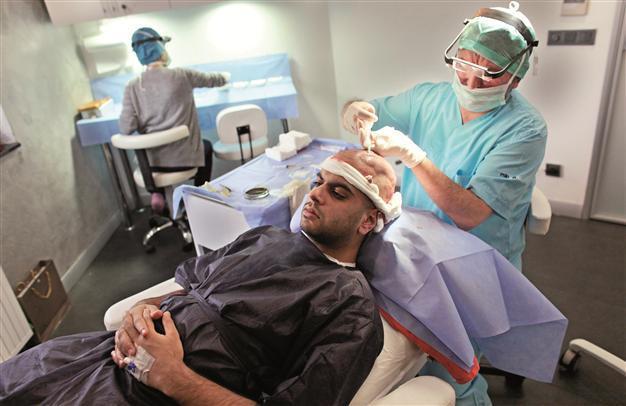Turkish tourism branches out: Implant with ski trip
ISTANBUL - Reuters

People from countries with heavily congested health systems welcome the opportunity to choose the time of their surgeries, while those from less-developed nations are attracted by Western-trained medics and new facilities sprouting up as Turkey’s private healthcare industry flourishes. REUTERS photo
Sitting in a private clinic in an upscale neighborhood of Istanbul, Saleh, a human resources executive from Qatar, is preparing to leave Turkey with a smile on his face and more hair on his head.Having previously brought his wife and children to Istanbul for sightseeing and shopping, Saleh has returned as the new kind of high-spending visitor Turkey is increasingly seeking to attract: a medical tourist.
“There’s a social pressure to look good,” the casually suited executive, declining to give his family name, told Reuters as he sat waiting for a check-up a day after having hair follicles implanted in his balding scalp.”Two of my brothers and half of my friends had hair implants in Turkey. It was an easy choice after that.”
Turkey is on a mission to diversify away from the all-inclusive package tours to its sun-drenched Mediterranean shores which, local businesses complain, often do too little for the local economy. Of 37 million tourists visiting Turkey last year, about 270,000 came for surgical procedures, from moustache implants and liposuction to operations for serious ailments, generating $1 billion in revenues and representing a small but growing fraction of tourism receipts.
“They usually come for three days. We offer them shopping or skiing tours, they get well and have a short vacation,” said Kazım Devranoğlu, the medical head of Dünyagöz Group, which has 14 eye care clinics in Turkey and branches in western Europe.
Around 10 percent of the group’s patients, some 35,000 people a yea, are now coming from abroad, he said. “They are mostly from western European countries like Germany, the Netherlands, Belgium, as well as from Algeria and Azerbaijan.”
There are various factors behind Turkey’s appeal. People from countries with heavily congested health systems welcome the opportunity to choose the time of their surgeries, while those from less-developed nations are attracted by Western-trained medics and new facilities sprouting up as Turkey’s private healthcare industry flourishes.
The mustachioed stars of Turkish soap operas, popular across the Middle East and North Africa, have also prompted an influx of men seeking a virile addition to their upper lip.
Health professionals and patients say plastic and corrective eye surgery costs, including travel and accommodation, can be up to 60 percent below comparable programs in western Europe.
The government aims to double medical tourist numbers to half a million a year over the next two years and raise revenues to $7 billion by attracting them to higher-margin healthcare.
“We see Turkey as a prime destination for medical tourism,” said Dursun Aydın, head of the international patients department at the Health Ministry. “We have experienced doctors. Hospitals are new. Turkey is relatively inexpensive and the temperate climate helps too.”
Tax-free health zones
The phenomenon is a boon not only for Turkey’s tourism industry, which risks locking itself into a price war with rival destinations such as Greece and Spain, but also for its booming private healthcare industry. Parliament passed new regulations in February to make private investment in the healthcare sector easier, a move it hopes could unlock billions of dollars of investment over the next few years.
Turkey’s status as a medical tourism destination could add to the allure. Though the idea is still on the drawing board, the government is considering airport-accessible, tax-free health zones which would aim to attract up to 85 percent of their patients from abroad, while offering tax incentives for investors. Under the new law, the state will rent city hospitals built and run by the private sector for 25 years.
“The aim is to revitalize ageing hospitals. While built primarily for Turkish citizens, they’ll be luxuriously equipped and will aim to draw at least some of their customers from abroad,” said Aydın.
Growth has already been phenomenal, said Tolga Umar, chief executive of Visit and Care, a patient and doctor matching service which helps visitors from the Middle East and Europe.
“We’ve been matching patients and doctors for six years now. Back then there were few other players, but now hospitals have international patient management departments doing direct marketing,” he said. “Even tour operators ask prior to a visit whether you want to have a dental exam or corrective eye surgery.”
















